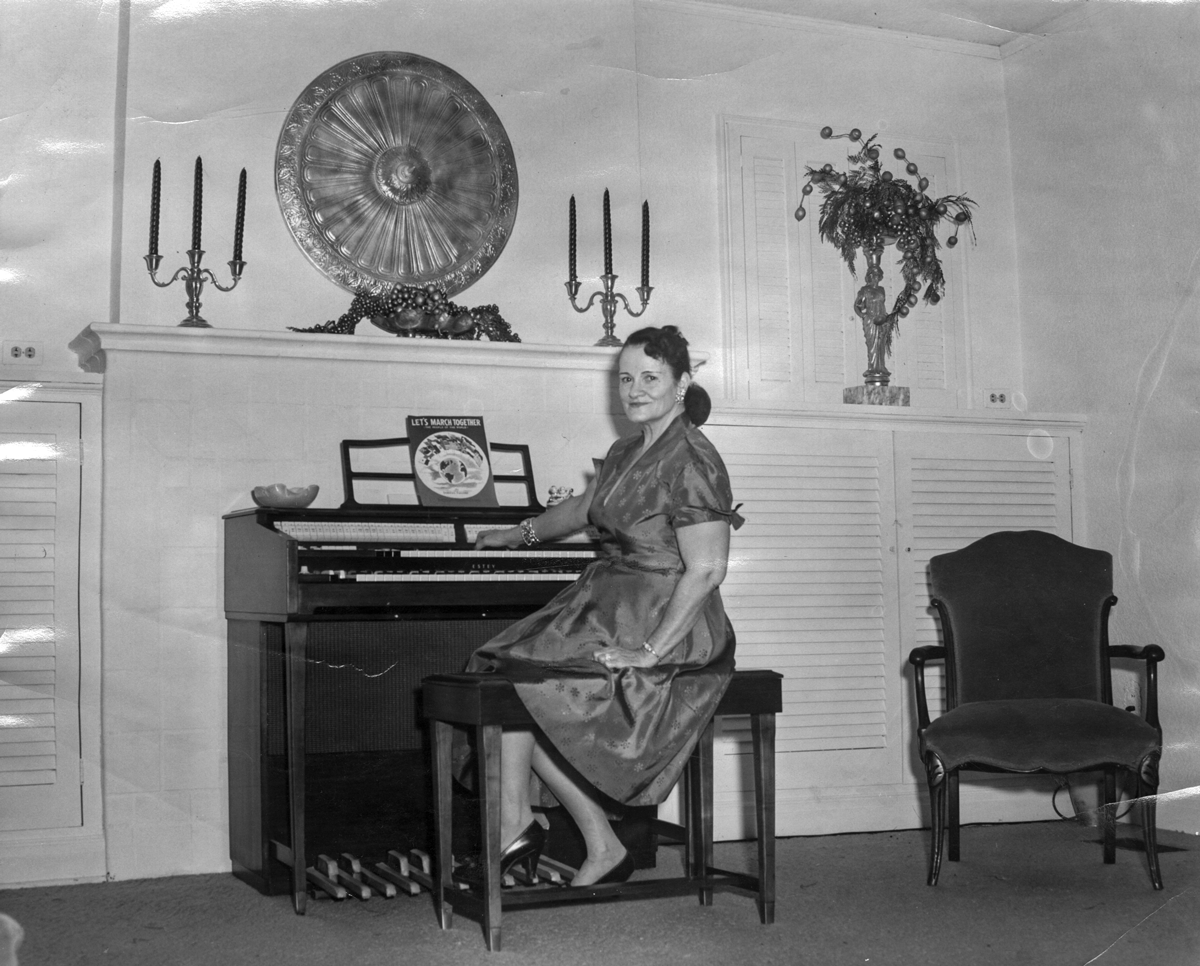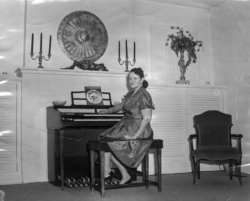Give Me Louisiana
The ballad of Louisiana’s former state song
Published: June 1, 2024
Last Updated: September 1, 2024

Hill Memorial Library, Louisiana State University
Doralice Fontane at her piano, ca. 1950.
A perennially neat piece of legislative frivolity is the official state thing—Alabama has a state nut (the pecan), Florida has a state pie (Key lime, obviously), Maryland has a state crustacean (the blue crab), and Vermont has a state . . . sweetener (maple syrup). There are official state flowers, official state birds; Kool-Aid is Nebraska’s state soft drink, whereas milk is Nebraska’s state beverage. Twenty-eight states have an official amphibian, and in four of them, it’s the standard American bullfrog. And nearly every state has at least one official song. The exceptions are Maryland—which retired its 1861 song “Maryland, My Maryland” in 2021 because of pro-Confederate lyrics—and New Jersey, which has never adopted an official state song, despite multiple bids for Bruce Springsteen’s “Born to Run.”
The New Jersey statehouse’s lack of love for Bruce is a whiff of the sort that is surprisingly common in the state song business, which is rife with missed opportunities. Michigan, historic home of Motown, has an obscure and forgettable 1930s ballad called “My Michigan.” In Mississippi, there are no official state laurels for the Delta blues. Tennessee has a dozen state songs, and none of them carry even a whisper of acknowledgment for the impact of Sun or Stax Records, though early Nashville country is represented—and so is alt-country, in the form of Steve Earle’s “Copperhead Road,” a song about a renegade moonshiner and pot farmer that was added to the state song roll in 2023.
Thankfully, Louisiana—a state for which the bar should be set high—has mostly understood the assignment. Allen Toussaint’s dreamy “Southern Nights” was added to the Louisiana state song list by a unanimous vote in the summer of 2021, designated as the state cultural song. In 1990 “The Gifts of Earth” by East Carroll Parish native Frances LeBeau was named Louisiana’s environmental song. The classic “You Are My Sunshine,” as performed by multi-term governor and Country Music Hall of Fame inductee Jimmie Davis, remains the official state song.
Tennessee’s approach to the state music concept has generated a full-length album’s worth of state songs. But in Louisiana, per the Baton Rouge Advocate report on HB351’s trip through the legislature, our state leadership decreed that to add an official song, they must also remove an official song. This was “Give Me Louisiana,” written in 1970 by Louisiana State University class of 1927 alumna Doralice Fontane.
“Give Me Louisiana” was Louisiana’s only state song from 1970 until 1977, when “You Are My Sunshine” was added. (A 1968 effort to obtain state-song status for the former governor’s tune had been vetoed on the grounds that it doesn’t refer to Louisiana by name.) “You Are My Sunshine” and “Give Me Louisiana” shared state song status from 1977 until 2021—possibly in part because during the campaign to add “You Are My Sunshine,” Fontane, who was in her sixties and (according to the Advocate) lived just a few blocks from the governor’s mansion, protested the potential song shake-up in person.
Fontane, who was born in Moreauville, became her church’s organist at thirteen and began composing her own songs two years later. She received a degree in music from LSU and taught voice, organ, and piano throughout her adult life. Fontane married a man named Cassano but continued to use her birth name as the credit on her body of musical compositions, which the LSU Library (which holds her papers in its Special Collections at Hill Memorial Library in Baton Rouge) describes as “prolific.”
“Give Me Louisiana” is a relatively generic moonlight-and-magnolias ballad. Fontane wrote it as a deliberate bid for the state’s official song, and it could be considered her most successful work inasmuch as it did in fact gain that title and hold it for more than fifty years. But Fontane arguably worked even harder to advocate for another piece; at the first rumblings of the Korean War in the late 1940s, she composed a hymn to world peace called “Let’s March Together (People of the World)” and sent the sheet music to about two thousand politicians, United Nations delegates, religious leaders, and entertainment-industry players. Eighteen hundred of those who received the music wrote back to Fontane. The LSU Library’s notes on the Doralice Fontane papers describe them as “consist[ing] primarily of letters of acknowledgement from various individuals for the complimentary copies of ‘Let’s March Together,’” which came from eminences including Eleanor Roosevelt, J. Edgar Hoover, John F. Kennedy Jr., and Spanish dictator Generalissimo Francisco Franco.
Fontane’s song was removed from the official state roster forty years after her death in 1981. But if she’d been alive to advocate for it, maybe the legislature wouldn’t have axed it. Apparently, her direct-mail blitz—and remember, this was back in the days when one could not simply BCC two thousand power brokers on an email—wasn’t her only or her most aggressive promo effort for “Let’s March Together.” According to LSU, she also gave a nephew, a military pilot, copies of the song; he handed them off to an attack bomber named Leo Profilet who air-dropped the sheet music over North Korea. Who knows where global politics would be if Toussaint’s groovy “Southern Nights” had fallen from those skies instead?
A columnist since 2016, Alison Fensterstock has written for 64 Parishes about music, dogs, witches, hippies, and other things.
